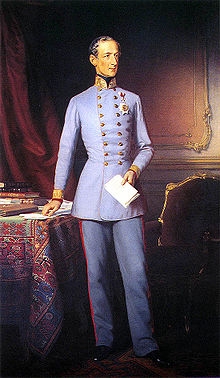Felix of Schwarzenberg

Felix of Schwarzenberg (Krumau, Bohemia, Austrian Empire, October 2, 1800 - Vienna, April 5, 1852) was an Austrian aristocrat, soldier and statesman. He took charge of the government after the fall of Metternich following the Revolution of 1848 in Vienna, until 1852.
Biography
Felix was born at Český Krumlov Castle in Bohemia, the second son of Prince Joseph of Schwarzenberg (1769-1833) and his wife Pauline of Arenberg. The House of Schwarzenberg was one of the most influential noble families in Bohemia; His older brother Prince John Adolf II of Schwarzenberg would later begin construction of the Emperor Franz Joseph Railway, the line from Vienna to Pilsen, while Felix's younger brother Frederick became Archbishop of Salzburg in 1835 and Archbishop of Prague in 1849.
Nephew of Prince Carl Philip of Schwarzenberg (1771-1820), commander of the Austrian armies in the last phases of the Napoleonic Wars, also serving in several Austrian embassies. Schwarzenberg after a brief military interlude entered the diplomatic service, where he became a protégé of the state chancellor Prince Klemens von Metternich and served in several Austrian embassies in St. Petersburg, London, Paris, Turin and Naples. During his time in London as an attaché in 1828 he had a love affair with Jane Digby, whom he abandoned after getting her pregnant and causing her husband – Edward Law, 1st Earl of Ellenborough – to divorce her. This episode led to him being nicknamed the "Prince of Cadland" being applied to him in London.
He was a diplomat and later governor of the city of Milan. He took charge of the government after the fall of Metternich following the Revolution of 1848 in Vienna, until 1852. He considered that the abdication of Emperor Ferdinand to his nephew Archduke Franz Joseph was necessary for the future of the Austrian monarchy. As chancellor of Franz Joseph, his objectives were to maintain absolutism and centralized power in Vienna.